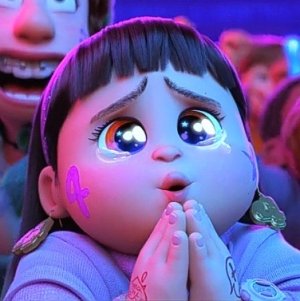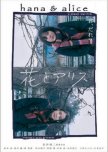
Watching this (as many other reviewers noted) was like reading a love letter. You see the story of two best friends, liking the same guy. That probably sounds shallow but it's something that happens in real life especially as you grow up and experience the wonders of a first love. And that's precisely why I love Hana and Alice. It's simplicity as a story calms you. It's nothing more than a simple tale that doesn't try to be too much than that it originally intended.
Iwai just delivers everything with such beauty. The colors aren't exotic nor are they bright but in a way, there's so mellow (but not in that dark way) and so refreshing to the eyes that you also fall in love with what you see on screen. These colors makes you feel closer to the characters and their story. Each scene, each setting is filled with visual beauty, I cannot praise it enough. Add some amazing soundtrack, the feels are everywhere. Especially for me, who has just entered her twenties.
The balance between Hana and Alice's life is also a nice touch, the other doesn't outshine the other. After all, this is about them. The similarities (absence of a male figure in their life, ballet) but also the contrast (Alice's house is filled with messy things while Hana's house is filled with flowers) shows the attention to details, the delicate choice that Iwai made. Also, Anne Suzuki and Yu Aoi just have such amazing chemistry together.
Yu Aoi's ballet dance sequence is so mesmerizing, I can watch her all day long. Anne Suzuki's heartbreaking confession is so pure, so heartfelt so evident of growing up, it brings back loads of memories.
Shinji Iwai is a great director that really does deserve more praise. He cares about setting as much as he cares about story as much as he cares about character. There's a fine balance of that here. (Always love his works with Yu Aoi too!)
Esta resenha foi útil para você?
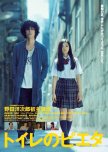
Pieta in the Toilet is a mix of arthouse feature and an indie flick. Daishi Matsunaga crafts a beautifully poignant film that feels very raw and honest. He does this with simplicity. Forget dramatic sun flares or slow motions, the use of sound, dialogue and camera work makes the emotions overflow.
Noda and Sugisaki have an interesting dynamic much like their respective characters—a struggling painter and an angst-ridden teenager. In them, an unusual friendship forms. It's actually such a treat to see these two interact. Noda embodies a just-get-by character, soft spoken and at times, even delicate and Sugisaki counters that. Loud, headstrong and jarring, she delivers with such fluidity, it's lovely to watch her on screen.
Pieta in the Toilet doesn't patronize. In fact, it doesn't try too hard given its somewhat melodramatic plot. Instead, its characters are the highlight. I would have just probably wanted for the characters to be fleshed out more. And instead of speaking between the lines, it's much more better to be direct. I feel like that part leaves too much blanks to feel.
But nevertheless, the cinematography is to love. And the overall aesthetic and colors are very flat—embodying the film's very characters. Powerful ending.
To those who don't understand the title and say it has nothing to do with the film. Actually, it does. Especially in the final moments.
Esta resenha foi útil para você?
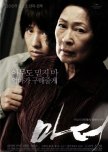
Kim Hye-ja displays a reverse Oedipus complex, protective of her son. Bong's attention to detail is prevalent, using Kim's acupuncture needles as symbolism for males' genitals to reserve the male-female role. Do joon (Won Bin) also highlights a complicated male-female relationship when the murdered girl questions his masculinity, resembling when his friend questions if he has even been with a woman and replies in an outburst.
Much more daring in its use of violence compared to Bong’s similar films like Memories of Murder, Bong’s signature dark aesthetics and gritty tones is a plus in the film’s overall mood. Brutally endearing and heartfelt performances fill this feature.
Esta resenha foi útil para você?
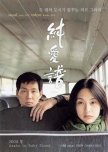
The film looks at two characters who longs to be anywhere but here, who live mundane, dull lives dreaming of escape—one they seem to reach, virtually. These two lonely individuals, U-in—a civil servant who works on routines, lives in a big empty apartment, has no 'real' friends and is living away from family is sexually frustrated and lonely and Aya, a young woman preparing for her college entrance exams, has a partner-swapping parents, a brother stuck on manga who wishes to die.
U-in seems to embody the non-assert type, perhaps plagued by years of having been alone and frustrated—a type challenged by the assertive, aggressive Mi-a, whom U-in develops an infatuation for. In a way, this relationship is a contrast of sorts, each of them being at the end of each other's spectrum. U-in's quiet and sad demeanour is turned down by Mi-a's rebellious red hair, smug glances and mysterious vibe—something a typical and symbol of absolute freedom, one that U-in doesn't seem to achieve, except perhaps at night when he's engrossed at his internet porn.
But see, rain fascinates him (just as much as his co-workers), the light of his computer and even the happenings outside his room—reminiscent of the office life and tough "salaryman" duties while Mi-a, dully holds two pieces of eggs seeming to dismiss traditional femininity imposed on her and more to that, dismisses it as the film reveals her sexuality—a slap to U-in face.
In some way, Mi-a is also the total opposite of Aya. While Mi-a's rebellious look stands out, Aya is quiet and soft, meek-looking young adult. But ultimately, the very symbol of teenage angst—she wants to die. And die a death that she can choose as she believes that this is the greatest freedom one can have. While Mi-a actively lives the way she wants, Aya wants to die the way she wants, mysteriously, between today and yesterday.
It's interesting how U-in and Aya's relationship played out, starting from the screen, possible because of consumption and money. It seems like compared to Mi-a, U-in has control of "Asako", Aya's virtual identity, having the choice to zoom, pan, control the cameras and it seems like at some point, Asako responds to his command, much to his happiness—this shows how 1. the virtual reality provides comfort "for lonely men", reminiscent of the commodities present in Japan 2. how the two lonely individual connect through untraditional means (sex industry).
It's also interesting to know that Aya's ruby shoes or Alasakan background represent a fantasy. Like Dorothy's shoes, it seems to provide escape, a sense of illusion and fulfilment. But unlike Dorothy's shoes, it does not change anything for Aya—as shown when she just bought it and then a piece of chewing gum gets stuck on it. In a way, like Mi-a's hair, the sparkling ruby shoes seem to show something like a wish, fascinating illusion of escape. The two regardless of ethnicity, of place, of time—connect, made possible through the internet.
The underlying social commentary lies more with inter-ethnic and political reconciliation of the absence of the "South Korean women" in the film.
Esta resenha foi útil para você?
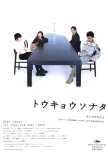
Tokyo Sonata depicts a traditional family: father works, mother is a housewife and sons are studying. Ultimately, this may seem like a typical family where father works, mother nurtures and children study.
But underlining the conventional image of a family, is a broken bond; each struggling on their own.
Father tries to reinforce his status as the head of the family, always bickering about his authority, his fear of losing face because he can no longer provide of his family.
I will protect you!
These are words he needed to do, words he needed to believe but can no longer do.
Mother tries to be the best housewife. She cooks, she cleans the house, she takes care of the children. But she is trapped. She is drowning. She doesn't have a path. In order to be a mother, it seems like she has thrown away herself.
Takashi is aimless. He longs to look for happiness. He longs to protect his country to protect his family. In a way, he tries to do what Father couldn't do in the long run.
Kenji is discovering himself. He finds a passion, a dream but is stopped by Father. A dream, crushed before it can be flourish. His wings cut even before they could be spread.
And so a family disintegrates. Because each member it broken. Because each member chooses to sever the bond that connects them as they face their inner struggles. It begs the question: is family really a family when no one is treating is like family? Does having mother, father and children in one house enough to be called family?
With documentary-like narration and raw visuals, Kurosawa creates something so simple and transforms it into something powerful. Kenji, Mother and Father's (and to an extent, Takashi's) are woven out, put side-by-side but with great clarity and balance.
In the end, the way it concludes is simply by coming home after an epiphany—which all changes every one. Perhaps the answer is that we need to fix ourselves first and then we can start fixing our family.
Each narrative is symbolic. Kenji getting caught. Father on an accident. Mother driving away to the beach. Takashi going to a foreign land. Each one represented something for the characters.
Beautiful score. Great performances from all the actors. But the ultimate cherry-on-top is the final piano performance. Playing the whole song makes you feel at peace, beautiful, tranquil.
Esta resenha foi útil para você?
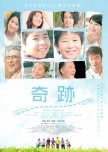
Koreeda understands children. Here, he portrays the children's "innocent" and wishful thinking in a manner that it should be. Koichi's wish of a family being together (to his final wish) shows a 12-year-old child's longing and eventual acceptance of the things he can and cannot change. Ryu's wish for something reflects his innocence to his final wish reflects his growth and understanding. This is the same for the other young supporting characters as well.
I Wish isn't dramatic, perhaps it would even come out not as strong as Koreeda's other films (it's tone is similar to that of Our Little Sister and both were received well in Cannes). But it didn't matter because the star of the film are the children and how they're making sense and living their own respective situations. It's gentle and it's so natural. Once again, Koreeda proves his consistency as a director with his trademarks: frame and music pacing, young talented cast, little details, family theme, the apparent contrasts, beautiful cinematography and symbolism.
Here, we have much more upbeat songs which reflects the film's overall tone. The two leads being brothers in real life is a very good decision as it helps a lot with the chemistry. That's also saying that the young cast is such a delight to watch. The little details in the sponge cake, swimming trunks, volcanic ash, CD, vegetable, horse-meat sashimi are recurring and symbolic throughout the film.
The central theme revolving around two bullet trains intersecting is also a really nice touch: it reflects the brothers and their life. Each living at the end of each other (one in Kagoshima, known from being next to a volcano and the other in Fukuoka while not "countrysides", it's less suffocating that Tokyo; hence, really beautiful setting) and each of them going in their separate ways. Hitching a plan to meet and see this "miracle" of two trains symbolizes them.
The apparent contrast between the two also compliment each other: the eldest is unhappy and grumpy, the younger one is energetic and happy. Living in Kagoshima is problematic while living in Fukuoka seems more carefree. The father is a happy-go-lucky while the mother is more serious. Koichi wears a uniform to school and lives with his grandparents while Ryu doesn't wear a uniform and lives his father and his band mates. These contrast work to show the opposite between the two yet what also ultimately ties them together: brotherhood.
Perhaps the fact that its 2 hour running time seem to feel a little draggy and long to watch. I had no problem with Our Little Sister's lack of direction/ultimate goal and just mere storytelling which is similar to I Wish but I think I Wish touches on little sub-plots that could have been avoided so as to not let it feel like it was too stretched out. But other than that, this is another one of Koreeda's great works.
Esta resenha foi útil para você?
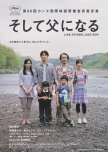
Like Father, Like Son is bittersweet tale that is jarred with the power and emotional bond of family. It takes into question: what makes a family? Is it blood or is it the bond? Is blood truly thicker than water? Swapped children is nothing new, it's a trope. But what Koreeda does is look into this issue in detail, explore it, strip its characters bare and allows the viewer to experience (and question) the responsibilities, the decisions and the identities made/done in the film.
It is a dramatic film but not one that drowns you in useless melodrama, not one that forces you to cry and not one that feeds you with cheesy lines as family. But instead, there is rawness, there is delicate emotions portrayed and more importantly, there is realness.
Again, Koreeda channels extraordinary young talents with the two boys -- Keita and Ryusei. Not only does the contrast between the two complement their differences but it also intensifies the differences of the two families. How will a carefree boy adapt to an independent, almost traditional life? How will an independent boy adapt to a non-traditional, carefree life? How will a work-oriented father bond with his energetic, non-traditional son? How will a fun-oriented father bond with his traditional, almost serious son?
These challenges show that the people who struggle in these circumstances are not adults alone, but also the children. Keita (his real life name) portrays Keita's cuteness with invisible strength and innocence. Shogen Hwang portrayed Ryusei's energy with utmost maturity and curiosity.
Masaharu Fukuyama portrays Ryota with a distant facade that eventually tears down while Jun Kunimura balances it out with her calm and honest personality. On the other side, Lily Franky portrayed the film's comic relief that wields undeniable wisdom of fatherhood to match Ryota's and is further complemented by Yoko Maki's gentleness and cheerfulness. Each and everyone of these actors portrayed their characters with unmatched performance.
It won Jury Prize in Cannes for a reason. And it has caught the eye of Spielberg for a reason.
Amazing cinematography with attention to details (e.g. Keita's hand made rose) that plays itself as something symbolic or important in the film. Not to mention the music pacing with the frames, such beautiful piano to listen to. And finally, the contrast of the close up from the adults' POV to the children and the long shots of the children's POV to the adults. These decisions, as a whole, make Koreeda truly a talented film maker.
Esta resenha foi útil para você?
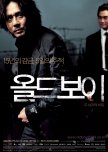
That's Chan-wook's little insert right there. The original manga that Oldboy is loosely based on isn't as grim as this adaptation. The film was dark and an powerful revenge story with one of the best plot twists ever. (Sadly, I have known the plot twist even before watching the film but it didn't take away the effectiveness of the reveal.) Dae-su is a grimier version of the original manga's lead which complements the story and the revenge so much more. It is brutal and filled with madness just like Dae-su himself. Chan-wook knows how to keep his cards, as if a knife is as the edge of your throat until he carefully laid each one out.
For a dark film with dark overtones and gritty visuals, the use of music contrasts the overall aesthetics. Playing Vivald's Four Seasons is a great way to bring out the mayhem and intensity of the film especially during action scenes filled with dramatic build-up. The cinematography reminds me of Netsuya Nakashima's The World of Kanako. While Oldboy doesn't use the same fast-crazy-cuts, it still does it during intense scenes which heightens the suspense.
My favorite scene is the corridor fight scene which was taken in one go. Definitely felt natural and real. Choi Min-sik is great as Dae-su so as Yoo Ji-tae (who is also in Memories of Murder) which serves as Dae-su's contrast both in appearance and personality. I'm not sure if it's intentional in Chan-wook's behalf but the great use of Oedipus Rex (best if you're familiar with it) just amazing it setting out the story and characters.
Oldboy deserves the praise it gets and the hype it has. It strips its characters bare and lays out their deepest and darkness parts but never tells you to hate or love them, instead you as a viewer, make that decision. It shows rawness and boldness just like how its story goes.
Esta resenha foi útil para você?
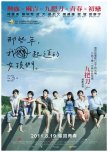
You Are the Apple of My Eye is one of those movies. See, I've always been a big fan of Asian dramas and have watched a couple of Asian films that are surprisingly good. I had the same expectations for this movie and it did not fail me.
I love the simplicity of the plot. Sure, high school romance. But the big big big surprise is really the ending. I love how it was pulled out, totally unexpected and will really make a mark in your heart. Totally not wishy-washy. I love how the time span of the movie extends from teenage years to adulthood, you can see the friendship, the dreams and heartbreak develop throughout the film.
I definitely loved the characters. Though childish at times, they actually each have such unique personalities. I love the acting of the actors especially the main character, Ko-Teng. I think he played off the bad-boy-childish-character fairly well enough.
I love the chemistry between Ko-Teng and Shen Chia-Yi. I love the sweet, bubbly and childish nature of this romance. I found out that this was actually based on a book and the author directed it and was his directorial debut, honestly speaking, not bad for a debut movie. And since he wrote the book, I bet he can really make the movie work as well.
Despite some childish elements (which may only appeal to young viewers at young at hearts) I think that the lesson of the movie is fairly clear. There's a lot of OMG revelations, symbolism and foreshadowing (YES!) that I actually missed while watching.
This is indeed a fun and cliche (but also full of surprises) movie that I think is suitable for viewers of all ages. I think that it's time to also give credit to foreign films and probably even time to make their mark in the film industry.
Esta resenha foi útil para você?

Maybe those are clouded my judgement.
But I admit, Master is not a perfect film. It certainly helps if you love the actors you are seeing on screen.
Cold Eyes (2013) director, Ui-seok Jo makes the style of Master, a reminiscent of his 2013 hit. Fast-paced, suspense and action-filled. I did enjoy Master a little bit more though, I felt like it has more substance, however questionable it may be.
Lee Byung Hun plays the bad guy (not a first), the CEO of a big company, One Network who is scamming their customers and is involved in fraud cases among others. Kim Woo Bin plays the section chief of communications/technology, a tech-whiz of some sort and Kang Dong Won plays the head of the investigating team. The three have good chemistry—each a talented actor on their own.
No doubt Lee has an actor. My first time to see Kang (and quiet guy during the premiere as well) and crime/action films are not new to him. Kim, this is probably his best role (for me) to date. Though, better characterization would work—given that we have 3 contrasting characters. But I think Ui suffers from that problem regardless.
Kudos though for showing us two badass female characters, played by Uhm Ji-won and Jin Kyung, though they deserve more screen time. And justice for Jin's character.
Master is messy. It starts strong—intriguing even, leading us on, much like Cold Eyes' exposition. But ultimately, things start to get a little bit out-of-place. There is little backbone or sense in how things escalated. They either seem ridiculous or just not how it's supposed to go.
Ui tries to back it up with comic relief which Kim does well and contrasts with Kang's serious demeanour. Lee does it well too.
Yu Eok does well with the cinematography, contrasting Seoul's tall buildings to the Philippines' tropical and cramped houses. Though as a Filipino, it's still a bit disappointing that Tondo (one of the largest squatter areas and poorest is the one chosen to showcase including the poor environment and such, there is so much more to show than that but okay).
Action-wise, it's more intense than Cold Eyes but the latter has better suspense and build-up though the former tried to throw a plot twist that seems wow at first but ridiculous the next...due to the lack of a backbone.
It's not the "exotic" place that would save Master. It's the cast. It's the reason that, despite all its flaws, that I ultimately still enjoyed this.
Esta resenha foi útil para você?
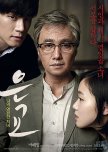
Maybe that sounds worse than a 70-year-old lusting over a 17-year-old but I say that Eungyo (or A Muse) is more daring because the scenes are more graphic and explicit, it almost seems like 10 minutes of soft porn. And given that Nikaido (only 20 then and didn't do a whole frontal nude) had prior acting experience, Kim Go-Eun did not (only 21 then, did a whole frontal nude).
I go with the comparisons given the lolita approach and the young age of the actresses and their characters. My Man had straight up skinship and intimate, sexual scenes but definitely not as graphic or explicit as Eungyo. Hence, still a sense of reservation even if the two leads are actually in love with each other.
Eungyo is daring. While the main focus might go to its controversial subject and explicitly, to me, the film is ultimately about loneliness. That is not saying that it normalizes pedophilia or whatsoever. The film is not meant to answer that. You, as viewers, can decide that on your own.
While My Man is filled with similar themes, it tries to make you feel colder towards its characters, added by the fact that it was filmed in Hokkaido.
But Eungyo. Eungyo warms you up. Eungyo is like a confluence. On one hand, there is warmth. There is purity. There is longing. On the other hand, there is disgust. There is the swelling in your stomach like you want to throw up. Then they meet and clash and you feel a little bit of both.
Jung Ji-woo establishes Lee Jeok-yo's played by Park Hae II (who is actually in his late 30s) loneliness very early in the film. The opening sequence of his house, of a portrait of him when he was young, of him in his office, of his rice cooker, of him eating alone, of him falling asleep in the chair of his study all say one thing about him: he is old and alone and lonely.
On the other hand, 17-year-old Eungyo has an abusive mother. She, too, as she confesses later on, is lonely, despite her energetic and lucid nature.
Jeok-yo's semi-assistant, semi-protege, Seo Ji Woo (played by Kim Mu Yeol) is an engineering major who respects, admires and looks up to his mentor and only longs for his recognition, which to his demise, does not really get. He wants to write but has no talent. He lives in an apartment by himself and has become a mask of his mentor. He, too, is lonely.
Thus, I see Eungyo more as a film about loneliness.
Filled with beautiful cinematography, heart-warming soundtrack and poetic narration, it's difficult not to appreciate it despite its controversial subject matter. Even Jeok-yo's very sexual dreams are shot beautifully in bright colors, nostalgic tone and over a pile of books, you too, are suck into this seduction.
Just like her character, Eungyo, Go-Eun shines. This being her debut role, only acting previously in school dramas, she is the sunshine of this film. Playing an innocent, flirty but to an extent, seductive Eungyo is no joke for a 21-year-old with no film experience.
She captures the emotions, the movement and the smile (oh gosh, the smile) that Eungyo embodies. She plays an enhancing and an irritating lolita. Eungyo is a character that longs affection and to me, sees Jeok-yo more as a father figure (probably even a case of Electra Complex) more than a lover.
Eungyo started off well. But the second half, almost as it reaches its end, it becomes a more revenge-driven cliche story than what it first intended to be.
That sad, the ending monologue between the main characters is powerful.
I wished they have chosen an older actor to play a 70-year-old character than put Hae II in heavy make-up. Maybe that very idea sickens them that they couldn't do it too. Nevertheless, Hae II played his character, twice his age well, even spending hours to observe the eldery prior to his role. The way he moves, walks and even talks are convincing but it's being covered in make-up that doesn't.
Esta resenha foi útil para você?
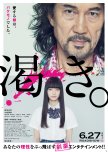
Kawaki (its more original title based on the novel by Akio Fukamachi, literally translated to Thirst) is graphic, gritty and insanely beautiful in its own twisted way. The crazy amount of jump cuts from one place to another, overwhelms to the point of suffocation and dizziness yet it makes you pay attention, it makes your eyes glued to the increase with the fear that you might miss a beat. It's almost as if you're being assaulted with all these images rushing before your eyes. Maybe for a thriller, it is a little too extreme.
There are four timelines, while complicated (and rather annoying) at first, it's not meant to make your head spin because it's actually just rather simple. When you adjust to this style, you'll eventually connect the dots. It's not meant to be a puzzle. Yet it gives off the vibe and makes everything so mysterious when it's really just...simple.
That's Asian cinema for you. A simple plot yet an insane mashup of sorts to make it engaging and edgy. The transitions are quick, spontaneous yet they are needed as it contributes to the overall storytelling and ironically, end up making things smooth. The colors are dull, empty and almost dead. Even with scenes with Kanako, where things are suppose to be brighter (or livelier), the colors are...empty as if to reflect her character. Yet it is beautiful to watch because there are empty colors and empty light flares yet the extreme close-ups gives you a light, almost seductive and evil vibe very much like our femme fatale, Kanako.
There's also the corny old-style music that plays during intense scenes which in general wouldn't fit but here, it acts as a contrast, to draw out the scene and the characters and their actions. And speaking of characters, while the story is about a search for Kanako, it's really her father, Akikazu Fujishima that we get to know more about. Other than the fact that he's a miserable old man...through his search for his daughter, we also come to understand more about his personality, the destruction of his family and eventually himself. His love and hate for his daughter is just like his white coat soaked with blood. Of course, Koji Yakusho gives a great performance. This father-daughter pairing makes you question if the fruit truly does fall far from the seed and that parents (and children) themselves can destroy each other. This a tandem deemed for oblivion.
But newcomers like Nana Komatsu (whom I love so I'm probably biased here) plays the good-girl-image so well and in the end, we don't really know anything about her except from what people think of her. That what makes her disappearance interesting and what thrives this drama. It backs us up in a corner, thinking how much of a monster our characters are based on what we are shown or what we are told. But are they really? Also, Fumi Nikaido and Hiroya Shimizu are amazing as well.
I love the metaphor around Alice in Wonderland and how it plays a part on Kanako's character. If you're expecting a closure at the end, don't. You have the "freedom" to choose what to believe in the end. (Ironically, freedom is destruction here) With issues like drugs, prostitution, rape, murder...The World of Kanako is truly a mashup of sorts. What is The World of Kanako in a nutshell? It's in the opening lines. "I love you...I'll kill you." It's really a film about twisted, destructive love. Nakashima plays around with so many elements, the beginning connects with the ending and so forth. It's actually been a roller-coaster watching this.
Esta resenha foi útil para você?
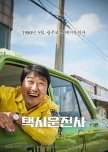
A Taxi Driver is an incredibly moving, inspiring and brave film. It's a film that honours the bravery of ordinary people, the unsung heroes that battle in the face of fascism and brutality. Taxi drivers, students, journalists—coming together to do one thing: tell the world.
As a journalism student, I have a romanticized view of the type of journalist I want to be—journalists like Peter. Those who risk their life to tell stories that are undiscovered and that are censored. That's the type of journalist I aspire to be. If that's what I'm going to end up becoming is another story. Perhaps that's one reason why the film shook me to my core. Given the political situation in Hong Kong as well and the tension between press freedom and self-censorship here, I feel that, as an aspiring journalist, I have the duty to tell the world things like this—just like Peter, just like Mr. Hinzpeter. And just like Mr. Kim (Sang Kang Ho), who feels that he has the responsibility to his taxi customer—and eventually, to his people.
This is an inspiring film given that to some, especially in a capitalist society (where I'm living), taxi drivers are not seen as honourable jobs. Even today, the reputation of journalists is diminishing. Yet, we have Mr. Kim, a widower who makes-end-meet to provide and care for his 11-year-old daughter as a taxi driver. And despite having to leave his daughter behind and in the face of danger and even death, he owned up to his responsibility.
I will take you to the airport no matter what.
A father that his daughter will forever be proud of.
Perhaps, if you too, see the horror and the brutality that he's seen in Gwangju, you would feel that you have the responsibility to tell the world about it—for a better future for your daughter and future generations. The characters are unsung heroes who are selfless and go through lengths to get the world out there. Jae-sik, a university student (Ryu Jun Yeol) and the taxi drivers.
I have seen many films with Sang Kang Ho in it but to me, this is one of the, if not the best performances of his to date. Sang, a veteran film actor proves his versatility combining comedy and drama and switching between the two with flawless execution. He is the heart of this film. But the soul is the bond, despite short, of the two men: Mr. Kim and Peter. In real life, Hinzpeter tried to search for the real Mr. Kim up until his death in 2016...with no luck. Mr. Kim's son said that his father passed away from cancer four years after the uprising. This film, is a tribute that's too late for the two. And for the other people who helped the two get the word of the Uprising.
Jang Hoon (who worked as an assistant director to Kim Ki Duk) and cinematographer, Go Nak-seon have done a profound job in the film's visuals. The details are apparent and particularly the chase scene between the disguised police and Kim and Peter looks like a sequence out of a dystopian film—a very good parallel to the horror of the fate of the protestors. Its combination of black/red and smoke just produces this eeriness and oozes an apocalyptic mood. That said, the taxi driver vs. military chase scene to me, is an amazing "action" sequence. Not only because of the way it was delivered visually but also emotionally.
Jang and Go makes use of saturated tones to achieve the vintage effect. With occasional slow-motions and close-up particularly during its dramatic sequences (blood flowing out, people getting shot) may perhaps be too sappy for some but it allows not only for drama but also for portraying the horror and a sense of hopelessness. Combine that with hospital scenes and injured protestors of bodies of the deceased—it overwhelms you but it tells you: this is wrong. And that is why we need to tell the world about it.
While A Taxi Driver may be different things like a tribute to the unsung heroes, it also taps on the dangerous roles of foreign correspondents and their local contacts particularly when it comes to war reporting. But this responsibility that we have to tell the world is carried in their heart.
Combining comedy with action is evident in its indoor scene as the characters laugh and cheer only to be swept away by the sound of bombs—looks trying to live normally while caught in the terror of war.
A Taxi Driver is powerful. It is brave. And it is inspiring. Perhaps no words are enough to say how I applaud these people (especially their real life counterparts) on their bravery. No, you don't have to wear a cape to be a hero. You could hold a camera. And you could drive a taxi.
Yup, I definitely cried bucket of tears for this one.
Esta resenha foi útil para você?
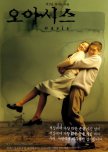
Lee Chang-dong portrays realism with harsh critique of society, at times, disturbing but also very provocative and tender. It is indeed a very challenging narrative to tell but Lee does it with great sensitivity. Lee doesn't romanticized his characters and their experiences but instead, normalizes them in a way that is both different and similar to us. He heavily comments on how society treats marginalized groups but doesn't explicitly tell us, that's wrong but we feel that. We cringe. We shudder. We feel disgusted. Angry. Like we want to do something.
His use of shadows, particularly of light is powerful. These are numerous shots of reflections of these characters -- in the car mirror in the opening shot, in Gong-ju's mirror. The repetitive symbolism of the Oasis, the shadows, the fear, the magic show that Jong-du and Gong-du desire for escape. They create their own fantasy world where they can be happy, fooling around and dancing -- just like anybody else. The shadows that Gong-ju fears and the magic that Jong-du does is particularly important in showing the comfort that the two find in each other.
Please don't disrupt my life, okay?
I could do that too!
I envy people with jobs!
She's watching! It doesn't matter!
I'm already pretty now.
You even call yourself a human?
You have to fit in to society, that's what being an adult means.
The people around these characters force them to become like them -- to fit into society according to their standards of how an adult should be, of now a normal person should be. And it shows how these standards affect the characters. And how when they are together, these standards don't matter. These standards are shit. Screw these standards.
Yes, Oasis is not an easy film to like. At times, it's comfortable. Particularly that scene at the climax of the film. But it's a very important scene that changes these characters -- one that breaks their fantasy world. And now that reflects us -- how we treat them. It is truly okay for them to take responsibility for what you have done just because he has nothing to lose, but you do?
But there is so much genuine and raw emotions here. Moon So-ri's performance is incredibly powerful, playing a character with cerebral palsy with such authenticity and care. A well-deserved Marcello Mastroianni Award for Emerging Actress indeed. Sol Kyung-gu's performance is heartfelt. Having worked on Peppermint Candy, the chemistry of the two is undeniable.
In the end, Lee tells a daring film; one that makes us rethink, provokes us and challenges us. This is a 2 hour of film of brilliance and power.
Esta resenha foi útil para você?
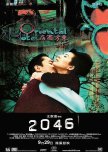
Having such a huge ensemble of well-known Asian actors from China, Hong Kong, Japan and even Taiwan (Tony, Zhang, Kimura) in itself makes 2046 a must-watch. It shows the powerhouse power of Asian cinema (even if it's mostly concentrated on East Asia but okay). 2046 is a daring film, much more daring than its more famous counterparts like Chung King Express and of course, In the Mood for Love.
Kar-wai, the auteur he is, combines 60s Hong Kong with sci-fi in such a non-linear narrative, much like his films, but it's really in 2046 that we see the intensity and effectiveness of that. The blend of the main story with the story of Chow's novel blend well, almost perfectly. Kar-wai here, transcends the realm of the present and the barriers of language.
His narratives are often called "weak" merely because they are simple and stretched out in a non-linear format and multiple arcs, but that's the Kar-wai way. It's unconventional. Combining 60s with sci-fi is an unlikely pair but he did. And does it so well that it's a big middle finger to mainstream film making/storytelling.
We have Cantonese, Japanese and Mandarin all played out and all three languages are dancing with the characters, another typical Kar-wai style. Cramped apartments that make inanimate object shots more beautiful, to cigarettes and smoking, to exotic music that makes you suffer from last song syndrome later (in different languages too!) to vibrant colors, everything is so beautiful to look at.
2046 is all about being stuck and choosing to move on. While there aren't as much setting shots as his other films, this one omits so with a purpose and to deliver the message he wants. Everyone on this film is stuck in the past, which makes them cling on to others. Like Kimura's, like Wong's and like Zhang's character, all of them are in search of moving on and especially Tony's. Kar-wai delivers his message in the most creative way possible.
Esta resenha foi útil para você?

